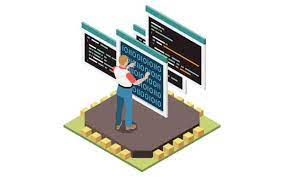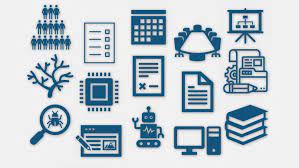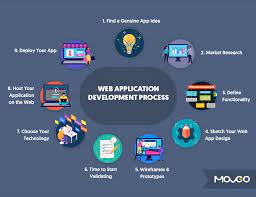In today’s digital age, software development has become an essential skill with immense career opportunities. Whether you aspire to become a professional software developer or simply want to enhance your technical skills, learning software development online offers a convenient and flexible way to achieve your goals.
One of the key advantages of learning software development online is the abundance of resources available at your fingertips. Numerous platforms, websites, and online courses offer comprehensive curriculum and interactive learning materials that cater to beginners and advanced learners alike. These resources often include video tutorials, coding challenges, and real-world projects that allow you to apply your knowledge in practical scenarios.
The flexibility of online learning is another major benefit. Unlike traditional classroom settings, online courses give you the freedom to learn at your own pace and schedule. This means you can fit your studies around other commitments like work or family responsibilities. Additionally, online courses often provide lifetime access to course materials, allowing you to revisit concepts whenever you need a refresher.
Learning software development online also offers the advantage of a global community. Online forums, discussion boards, and social media groups connect learners from all over the world who share similar interests. Engaging with this community not only provides valuable networking opportunities but also allows for collaborative learning experiences where you can seek guidance from experienced developers or share insights with fellow learners.
Moreover, many online platforms offer certifications upon completion of their courses. These certifications can serve as tangible proof of your skills and knowledge in software development, boosting your resume and increasing your employability in the competitive job market.
When choosing an online platform or course for software development, it’s important to consider factors such as course content quality, instructor expertise, student reviews, and cost. Researching different options will help ensure that you select a reputable platform that aligns with your learning style and goals.
In conclusion, learning software development online is a convenient and effective way to acquire valuable skills in today’s digital world. The flexibility of self-paced learning, the abundance of resources available, and the opportunity to connect with a global community make online learning an attractive choice for aspiring software developers. So why wait? Start your journey into the world of software development today and unlock a world of exciting possibilities.
7 Frequently Asked Questions About Learning Software Development Online
- What are the best online software development courses?
- What qualifications do I need to learn software development online?
- How long does it take to learn software development online?
- What is the best way to learn software development online?
- Are there any free resources for learning software development online?
- Is it possible to get a job in software development without a college degree?
- What programming languages should I learn for software development?
What are the best online software development courses?
There are several reputable online platforms that offer high-quality software development courses. Here are some of the best ones:
- Udemy: Udemy is a popular online learning platform that offers a wide range of software development courses taught by industry professionals. Their courses cover various programming languages, frameworks, and technologies.
- Coursera: Coursera partners with top universities and institutions to provide online courses in software development. They offer both beginner-friendly courses and more advanced programs, allowing learners to earn certificates or even complete full degree programs.
- edX: Similar to Coursera, edX collaborates with renowned universities and institutions worldwide to offer online software development courses. They provide a diverse range of programming languages and specializations, catering to learners at different skill levels.
- Pluralsight: Pluralsight is an online learning platform specifically focused on technology skills, including software development. They offer a vast library of video-based courses covering various programming languages, web development frameworks, and other technical topics.
- Codecademy: Codecademy focuses on interactive coding exercises and projects to help learners grasp programming concepts effectively. They offer guided paths for different programming languages like Python, JavaScript, and more.
- Treehouse: Treehouse offers interactive video tutorials on web design, web development, mobile app development, and more. Their curriculum is designed to be beginner-friendly but also covers advanced topics for those looking to deepen their skills.
- FreeCodeCamp: FreeCodeCamp is a nonprofit organization that provides free coding challenges and projects for aspiring developers. Their curriculum covers various aspects of web development and offers hands-on experience through real-world projects.
When choosing an online course or platform, consider factors such as course content quality, instructor expertise, student reviews, cost (some platforms offer free or low-cost options), and the specific skills or technologies you wish to learn. It’s also helpful to explore course previews or read testimonials to get a sense of the teaching style and learning experience.
What qualifications do I need to learn software development online?
When it comes to learning software development online, there are no strict qualifications or prerequisites that you must meet. Software development is a field that welcomes individuals from diverse educational backgrounds and experiences. However, having certain skills and qualities can be beneficial for your learning journey. Here are some qualifications that can help you excel in learning software development online:
- Basic Computer Skills: Familiarity with computers, operating systems, and basic software usage is essential. Understanding how to navigate through different interfaces and perform tasks on a computer will make your learning process smoother.
- Logical Thinking and Problem-Solving Skills: Software development involves analyzing problems, breaking them down into smaller components, and finding logical solutions. Developing strong problem-solving skills and the ability to think critically will greatly benefit you in understanding programming concepts.
- Mathematics and Analytical Skills: While not all areas of software development require advanced mathematics, having a basic understanding of mathematical concepts like algebra and logic can be helpful in grasping certain programming principles.
- Attention to Detail: Writing code requires precision and attention to detail. Being able to spot small errors or inconsistencies in your code is crucial for troubleshooting and debugging.
- Self-Motivation and Discipline: Learning software development online requires self-discipline, as you’ll need to manage your time effectively and stay motivated throughout the learning process. Setting goals, creating a study schedule, and staying committed will help you make consistent progress.
- Strong Communication Skills: Software development often involves working in teams or collaborating with others remotely. Effective communication skills will allow you to articulate your ideas clearly, ask questions when needed, and seek help from others effectively.
- Curiosity and Willingness to Learn: The field of software development is constantly evolving, with new technologies emerging regularly. Having a curious mindset and being open to continuous learning will enable you to stay up-to-date with industry trends and adapt to new programming languages or frameworks.
Remember that while these qualifications can be advantageous, they are not strict prerequisites. Online learning platforms and courses often cater to beginners and provide step-by-step guidance, making it accessible to individuals with varying backgrounds. With dedication, perseverance, and a willingness to learn, you can embark on your software development journey online regardless of your qualifications.
How long does it take to learn software development online?
The time it takes to learn software development online can vary depending on several factors, including your prior experience, the depth of knowledge you want to acquire, the amount of time you can dedicate to learning each day, and the specific programming languages or technologies you choose to focus on.
For beginners with no prior experience in programming, it usually takes several months of consistent learning and practice to gain a solid foundation in software development. This timeframe allows for understanding fundamental concepts, learning programming languages, and getting hands-on experience with coding exercises and projects.
However, it’s important to note that software development is a vast field with continuous advancements. Mastery of specific programming languages or frameworks may require more time and practice. Additionally, as you progress in your learning journey, you may find yourself exploring specialized areas such as web development, mobile app development, or data science, which can add additional time to your learning process.
Ultimately, becoming a proficient software developer is an ongoing journey that requires continuous learning and staying up-to-date with industry trends. It’s important to set realistic expectations and understand that proficiency comes with practice and real-world application of the concepts learned.
Remember that everyone learns at their own pace. Some individuals may grasp programming concepts quickly while others may require more time. The key is consistency and dedication in your learning efforts. Regular practice and building projects will help solidify your understanding and skills over time.
So rather than focusing on a specific timeline for learning software development online, prioritize setting achievable goals for each stage of your learning journey. Embrace the process of continuous improvement and enjoy the satisfaction that comes from acquiring new skills in this dynamic field.
What is the best way to learn software development online?
When it comes to learning software development online, the “best” way can vary depending on individual preferences and learning styles. However, here are some effective approaches that many learners find helpful:
- Online Courses: Enroll in structured online courses specifically designed for software development. Platforms like Udemy, Coursera, and edX offer a wide range of courses taught by industry professionals. Look for courses with positive reviews and comprehensive curriculum that cover the programming languages or frameworks you are interested in.
- Interactive Coding Platforms: Utilize interactive coding platforms like Codecademy or FreeCodeCamp that provide hands-on coding exercises and projects. These platforms often offer gamified learning experiences that make the learning process engaging and enjoyable.
- Video Tutorials: Watch video tutorials on platforms like YouTube or online learning websites such as Pluralsight or Lynda.com. Many experienced developers create tutorial series where they explain concepts, demonstrate coding techniques, and guide you through building real-world projects.
- Documentation and Online Resources: Explore official documentation provided by programming languages or frameworks you want to learn. Websites like Mozilla Developer Network (MDN) for web development or Microsoft Docs for .NET offer comprehensive documentation with examples and guides.
- Online Coding Challenges: Participate in coding challenges on websites like LeetCode or HackerRank to practice problem-solving skills and improve your coding abilities. These platforms often have a vast collection of coding problems categorized by difficulty level.
- Open Source Projects: Contribute to open source projects on platforms like GitHub to gain practical experience working collaboratively with other developers. This allows you to learn from experienced developers while building your portfolio.
- Online Forums and Communities: Join online forums such as Stack Overflow or Reddit communities related to software development to seek help, ask questions, and engage in discussions with fellow learners and experienced developers.
Remember that consistency is key when learning software development online. Set aside dedicated time each day or week to practice coding and reinforce your knowledge. Additionally, try to build real-world projects to apply what you’ve learned and gain practical experience.
Ultimately, the best way to learn software development online is to combine multiple approaches that work for you. Experiment with different resources and find a learning path that suits your learning style and goals. Happy coding!
Are there any free resources for learning software development online?
Absolutely! There are several free resources available online that can help you learn software development. Here are a few popular ones:
- FreeCodeCamp: FreeCodeCamp offers a comprehensive curriculum covering various aspects of web development, including HTML, CSS, JavaScript, and more. They also provide coding challenges and projects to practice your skills.
- Codecademy: Codecademy offers free coding courses on different programming languages such as Python, JavaScript, HTML/CSS, and more. Their interactive learning platform allows you to write code directly in the browser as you learn.
- MIT OpenCourseWare: MIT OpenCourseWare provides free access to course materials from actual MIT computer science courses. You can find lectures, assignments, and other resources on topics like algorithms, data structures, and programming languages.
- Coursera (Audit Option): Coursera offers many software development courses from top universities and institutions. While some courses require payment for certification, many allow auditing for free where you can access all the course materials without earning a certificate.
- edX: edX is another platform that provides free online courses from renowned universities and institutions worldwide. They offer a wide range of programming and software development courses in various languages.
- YouTube tutorials: YouTube is an excellent resource for finding tutorials on software development topics. Many experienced developers create video tutorials covering different programming languages, frameworks, and concepts.
Remember that while these resources are free, some may offer paid options for additional features or certifications. However, the free content available on these platforms is often sufficient to gain valuable knowledge in software development.
It’s worth mentioning that self-discipline and consistency are crucial when using free resources for learning software development online. Creating a study schedule and setting achievable goals will help you make the most out of these resources and progress steadily in your learning journey.
Is it possible to get a job in software development without a college degree?
Yes, it is possible to get a job in software development without a college degree. While a degree can be beneficial and may open up certain opportunities, the tech industry is known for valuing skills and experience over formal education credentials. Many successful software developers have built their careers through self-study, online courses, coding bootcamps, and practical hands-on experience.
Here are a few factors that can help you secure a software development job without a college degree:
- Build a Strong Portfolio: Focus on building an impressive portfolio that showcases your coding skills and projects. Employers often value practical experience and tangible examples of your work more than formal qualifications.
- Gain Practical Experience: Look for opportunities to gain real-world experience through internships, freelance projects, or contributing to open-source projects. Practical experience demonstrates your ability to apply your knowledge in real scenarios.
- Complete Online Courses or Bootcamps: There are numerous online platforms and coding bootcamps that offer intensive training programs in software development. These courses are designed to equip you with the necessary skills and knowledge required by employers.
- Obtain Relevant Certifications: Earning certifications from reputable organizations or platforms can help validate your skills and enhance your credibility as a software developer.
- Networking: Engage with the tech community by attending meetups, conferences, or joining relevant online forums. Building connections with professionals in the field can lead to job opportunities or valuable mentorship.
- Showcase Your Passion and Self-Motivation: Employers appreciate candidates who demonstrate a genuine passion for software development and have taken the initiative to learn independently.
- Develop Strong Problem-Solving Skills: Software development requires problem-solving abilities. Focus on honing these skills by practicing algorithmic challenges or participating in coding competitions.
It’s important to note that while not having a college degree may not be a barrier for many positions in the tech industry, some companies may still require formal education as a prerequisite. However, the demand for skilled software developers is high, and many companies prioritize practical skills and experience over degrees.
Ultimately, your ability to demonstrate your competence through a strong portfolio, practical experience, and continuous learning will greatly increase your chances of landing a software development job without a college degree.
What programming languages should I learn for software development?
When it comes to software development, there is a wide range of programming languages to choose from. The choice of programming languages largely depends on the type of software you want to develop, your personal preferences, and the industry or field you plan to work in. However, here are some popular programming languages that are widely used in the software development industry:
- Python: Known for its simplicity and readability, Python is a versatile language used for web development, data analysis, artificial intelligence (AI), machine learning (ML), and more.
- JavaScript: As the language of the web, JavaScript is essential for front-end web development and enables interactive user interfaces. It is also commonly used for back-end development with frameworks like Node.js.
- Java: A robust and widely adopted language, Java is used for building enterprise-level applications, Android app development, and large-scale systems.
- C#: Developed by Microsoft, C# is primarily used for building Windows applications, game development with Unity engine, and cross-platform mobile app development using Xamarin.
- C++: Known for its performance and low-level capabilities, C++ is commonly used in system programming, game development, embedded systems, and high-performance applications.
- Ruby: Ruby is a dynamic language known for its elegant syntax and simplicity. It is often used with the Ruby on Rails framework for rapid web application development.
- Swift: Developed by Apple specifically for iOS and macOS app development, Swift offers modern syntax and powerful features to create robust mobile applications.
- Go: Created by Google, Go (or Golang) focuses on simplicity and efficiency. It is often used in backend systems or distributed networked services.
- PHP: Primarily used for server-side web development, PHP powers many popular content management systems like WordPress and e-commerce platforms like Magento.
- Rust: Known for its focus on safety and performance, Rust is gaining popularity in areas such as systems programming, IoT, and building secure applications.
Remember, this list is not exhaustive, and the choice of programming languages may vary based on your specific goals and project requirements. It’s also important to note that learning the fundamentals of programming concepts and problem-solving skills is more important than focusing solely on a specific language. Once you have a strong foundation, it becomes easier to learn new languages as needed in your software development journey.




